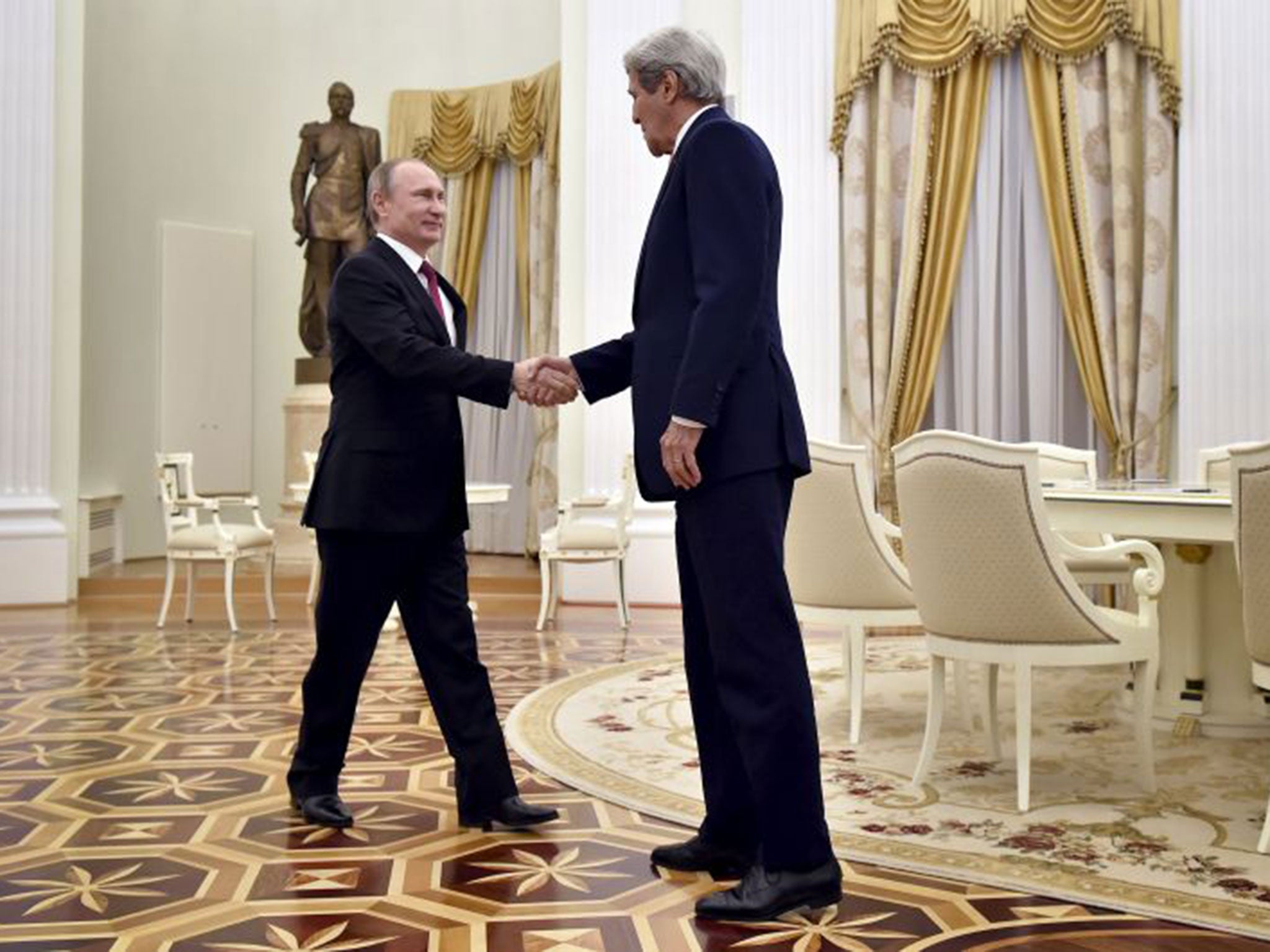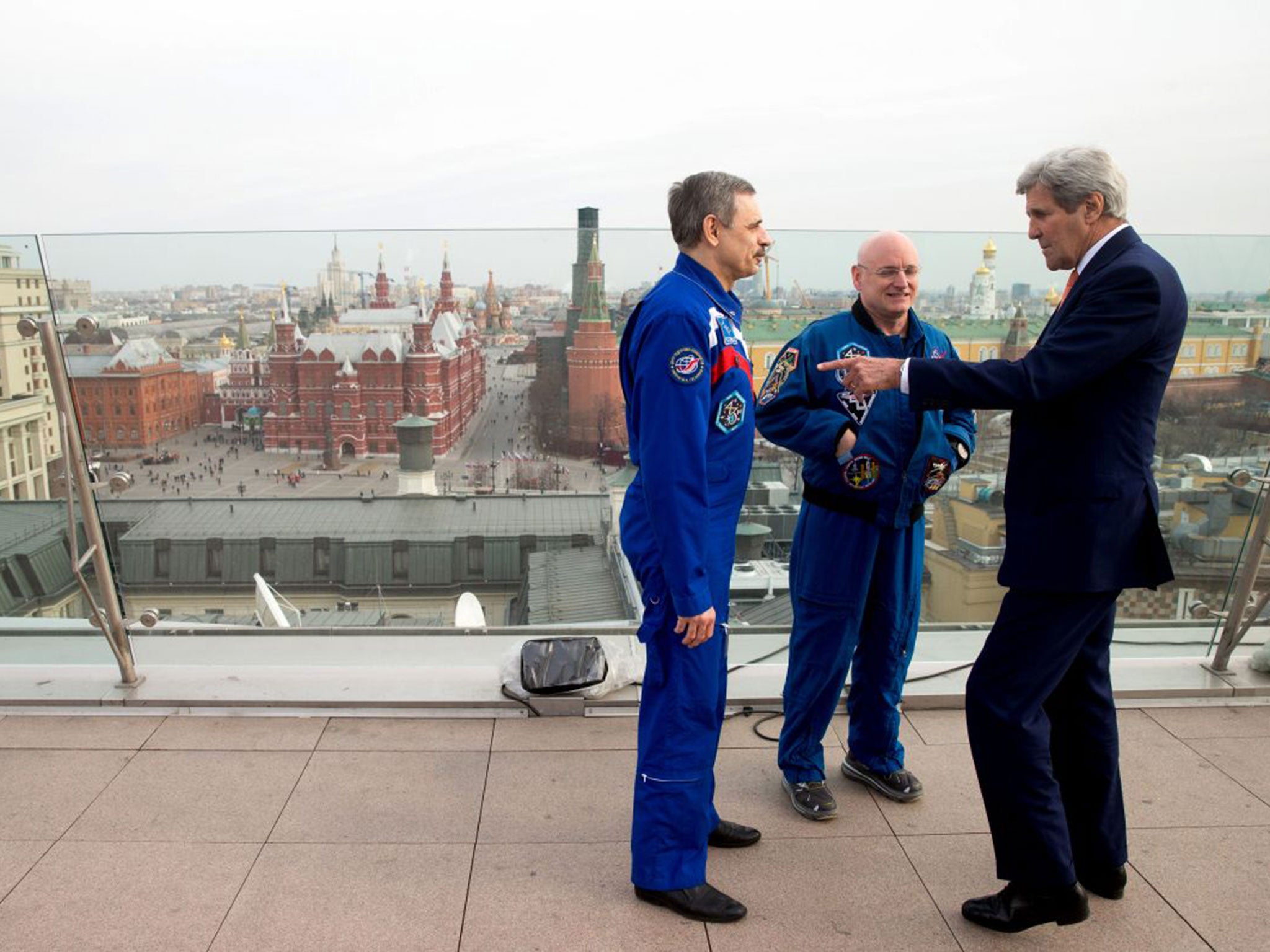John Kerry’s sojourn in Moscow is about shared mutual interest in Ukraine and Syria
World View: Neither the US or Russia can afford the Geneva peace talks on Syria to fail and, despite a Western consensus to the contrary, Moscow’s security interests have never been in de-stabilising Ukraine


Three days is a very long time for any international diplomat to spend in one place, still more so for a US Secretary of State who seems almost permanently in transit. The length of John Kerry’s trip to Moscow, which ends on Friday, is likely to reflect not just the importance the US administration currently attaches to relations with Moscow (for all the frost that afflicts the US President’s personal relations with Vladimir Putin), but also how sensitive a juncture has been reached.
At the top of the agenda for Kerry’s talks with Putin - the presidential audience being a sign of the importance Moscow, too, attaches to this trip - was Syria, with the US trying to gauge, for the umpteenth time, how far Russia will go to support President Assad, and Putin doubtless setting out, also for the umpteenth time, that Assad’s continued hold on power is secondary for Russia to the survival of the Syrian state. Both countries - yes, Russia, too - have much political capital invested in the Geneva talks, and cannot afford them to fail.
Accorded less advance billing for the Moscow meeting, but no less significant, is Ukraine, and the prospects for a more durable peace than the stalemate to which the country seems to be gravitating in so many ways. While there is reticence on both sides, it is nonetheless possible to detect a feeling - coming from the US, from the EU, and from Moscow - that a Ukraine settlement could just be “do-able”.
Contrary to most expectations, the ceasefire that was the first requirement of the Minsk-2 agreement - brokered by Germany and France, and signed in February 2015 - has more or less held. This makes it unlike its predecessor, the Minsk Protocol of September 2014, which lasted barely three months.

The ceasefire took a while to gain hold, and there have been violations on both sides, but there has been a disengagement of forces; heavy weaponry has been pushed back, and a cordon established. In Kiev, both President Poroshenko and his fractious government have managed to remain in power, although there are new manoeuvrings around the post of prime minister.
Some have speculated that the Kremlin saw its intervention in Syria last autumn as a way to distract attention from Russia’s attempts to consolidate its position in eastern Ukraine. In fact, almost the opposite appears to be true. The transfer of the international media spotlight from Ukraine on to Syria - has allowed Moscow to scale back its involvement, while satisfying Russia’s newly-aroused popular nationalism with footage of Russian military heroics elsewhere.
With Syria dominating the news media, in Russia and the West, both Kiev and the rebel forces in the east have also found it harder to play to the international gallery - which has been no bad thing. The Kiev government and the Ukrainian Parliament have done a reasonable job of passing a mass of new, reformist, legislation - although passing, is far from the same as implementing, and the rebel forces, initially in some disarray, have turned inwards to try to consolidate what they have.
The present situation leaves much to be desired. But those who forecast this time last year that a ceasefire would not hold because compliance depended on Russia, and Russia’s interest was only in destabilising Ukraine, have not been vindicated. Either the situation on the ground was always, and is still, beyond Russia’s control, or Russia has done its bit to support the ceasefire (up to and including some rather brutal treatment meted out to recalcitrant rebel leaders).
That the first provisions of Minsk-2 have largely been observed, however, does not mean that the later provisions will be, too. The next stage is for Kiev to enact - and implement - devolution of powers to the Donetsk and Luhansk provinces in the east, in recognition of their “special status”. This is supposed to include the holding of elections. Thereafter, Moscow is supposed to accept Ukraine as a sovereign state and Kiev’s control of the whole territory, while also recognising, and enforcing, a proper frontier.
But there is enormous resistance in Kiev to devolution, as set out in Minsk-2. There, it is seen as effectively signing off on a divided state, and long-term Russian meddling. Some Western diplomats also warn that Minsk-2 was confusing, and so inimical to Ukraine’s interests as to be impossible to implement. But the agreement, as it stands, was signed by all parties, and devolution is the price, as Russia sees it, that Kiev accepted for its territorial integrity. Everyone seems to recognise, willingly or not, that Crimea has to be put in a separate diplomatic box.
Moscow has stated publicly for months now that it will honour its part of the deal, specifically on territorial integrity and the border - but only when Kiev has delivered on devolution. This is an impasse that will delay, if not scupper, the whole agreement, with the likelihood that Moscow - and Putin - being blamed internationally for a failure that is not theirs.
The hope must be that the US and the EU jointly exert pressure on Kiev to keep its part of the bargain. This is partly what the talks in Moscow this week were about. Despite a Western consensus to the contrary, Russia’s security interests have never been in de-stabilising Ukraine, or even acquiescing in a “frozen” conflict. Russia wants a stable neighbour, with a statutory border - and that is in Kiev’s interests, too.
Join our commenting forum
Join thought-provoking conversations, follow other Independent readers and see their replies
Comments
Bookmark popover
Removed from bookmarks